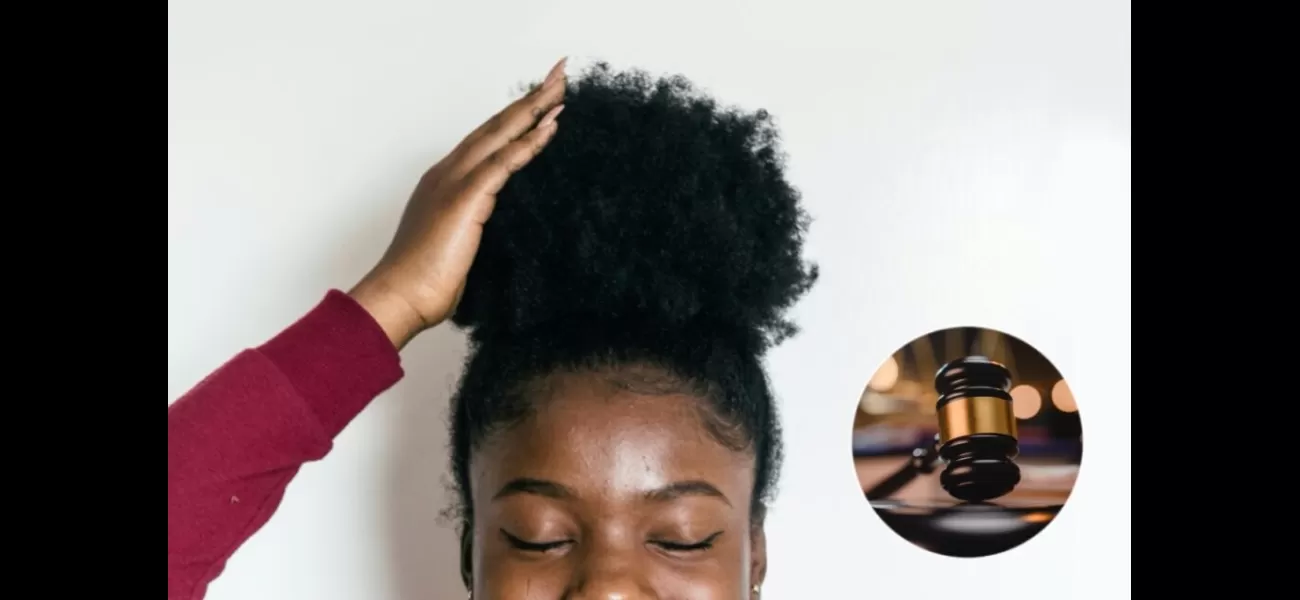Company reaches settlement in federal case for terminating female employee due to her choice of wearing natural hair.
Lawsuit reveals ex-boss criticized Jackson for her natural hair, deeming it "unacceptable" despite her having it in a neat bun.
April 9th 2024.

A recent legal battle between a Louisiana employer and the Equal Employment Opportunity Commission has come to a close with a settlement. The case was brought to light by Imani Jackson, who claimed she was wrongfully terminated from her job after deciding to stop wearing a wig and embrace her natural hair. Jackson had initially been hired as a sales associate at American Screening LLC, and was expected to wear a straight-haired wig as part of her uniform. However, after some time, she made the decision to remove the wig and proudly wear her natural hair to work.
Unfortunately, Jackson's employer did not share the same enthusiasm towards her new hairstyle. Despite her efforts to style her hair in a neat bun, her employer deemed it "unacceptable" and asked her to continue wearing the wig. Jackson refused to comply with this discriminatory request and was ultimately fired two months later in October 2018. To make matters worse, her position was then filled by a white employee.
The lawsuit brought forth by Jackson argued that her termination was a clear violation of Title VII of the Civil Rights Act of 1964, as it was based on racial discrimination. According to court documents, Jackson's hair texture, which was a "4-A" curl pattern commonly associated with Black people, was the target of her employer's discriminatory comments. As EEOC Chair Charlotte Burrows stated in a press release, an employer cannot ask an employee to change their natural hair texture, just as they cannot ask them to change their skin color.
After years of fighting for justice, Jackson will finally receive a monetary settlement from her former employer. As part of the settlement, American Screening LLC will pay her $50,000 in compensation, and they must also implement new policies that protect employees' rights to wear their natural hair. This case is just one of many that are contributing to the fight against hair discrimination, which has been further supported by the legalization of the CROWN Act in multiple states.
With this settlement, Jackson can finally put this ordeal behind her and move forward, knowing that her voice was heard and justice was served. As we continue to see progress in the fight against hair discrimination, this case serves as a reminder that change is possible and that every step towards equality is a step in the right direction.
Unfortunately, Jackson's employer did not share the same enthusiasm towards her new hairstyle. Despite her efforts to style her hair in a neat bun, her employer deemed it "unacceptable" and asked her to continue wearing the wig. Jackson refused to comply with this discriminatory request and was ultimately fired two months later in October 2018. To make matters worse, her position was then filled by a white employee.
The lawsuit brought forth by Jackson argued that her termination was a clear violation of Title VII of the Civil Rights Act of 1964, as it was based on racial discrimination. According to court documents, Jackson's hair texture, which was a "4-A" curl pattern commonly associated with Black people, was the target of her employer's discriminatory comments. As EEOC Chair Charlotte Burrows stated in a press release, an employer cannot ask an employee to change their natural hair texture, just as they cannot ask them to change their skin color.
After years of fighting for justice, Jackson will finally receive a monetary settlement from her former employer. As part of the settlement, American Screening LLC will pay her $50,000 in compensation, and they must also implement new policies that protect employees' rights to wear their natural hair. This case is just one of many that are contributing to the fight against hair discrimination, which has been further supported by the legalization of the CROWN Act in multiple states.
With this settlement, Jackson can finally put this ordeal behind her and move forward, knowing that her voice was heard and justice was served. As we continue to see progress in the fight against hair discrimination, this case serves as a reminder that change is possible and that every step towards equality is a step in the right direction.
[This article has been trending online recently and has been generated with AI. Your feed is customized.]
[Generative AI is experimental.]
0
0
Submit Comment





